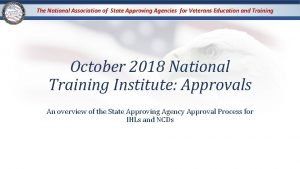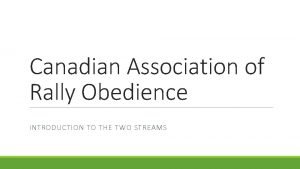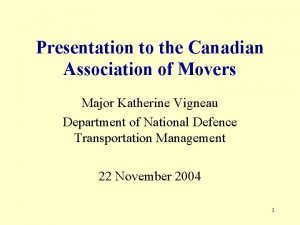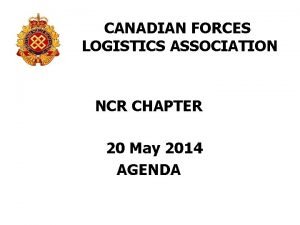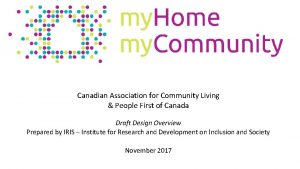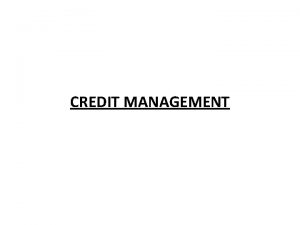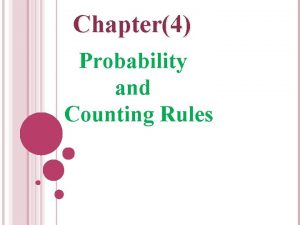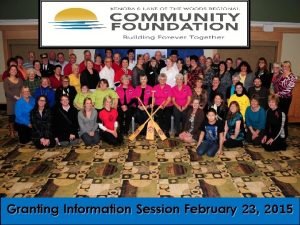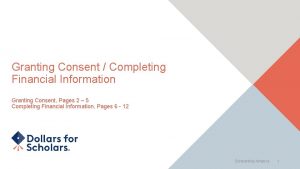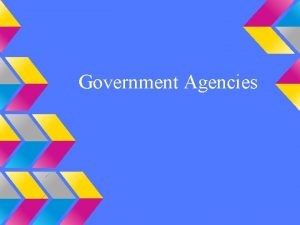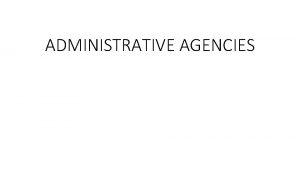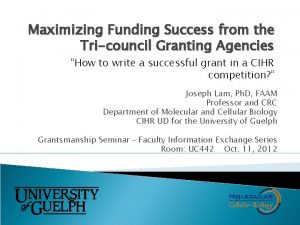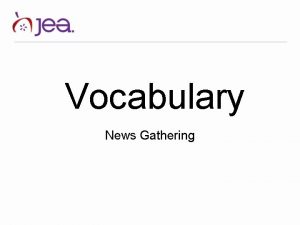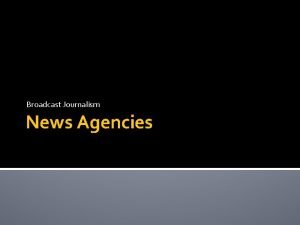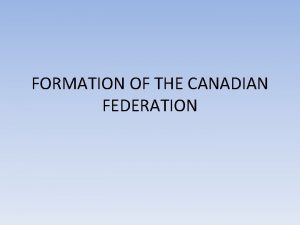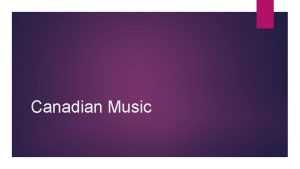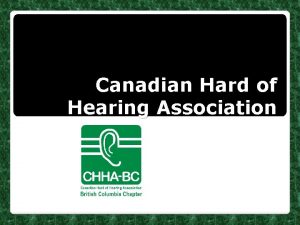News from the Research Granting Agencies Canadian Association














- Slides: 14

News from the Research Granting Agencies Canadian Association for Graduate Studies November 2018

2 Agenda • Scholarships and Fellowships Study / Horizontal Skills Review • Equity Diversity and Inclusion (EDI) – Update • Strengthening Indigenous Research Capacity • Support for Early Career Researchers (ECR) • CGS D program Harmonization – Update

3 Scholarships and Fellowships Study – Update • Direct support through scholarships plays a crucial role in developing excellence among research trainees. • Budget 2018 committed to exploring how to better support the next generation of researchers through scholarships and fellowships. • Looking at the suite of granting agency scholarship and fellowship initiatives--both tri-agency and agency-specific programs.

4 Scholarships and Fellowships Study – Update • Focus is on the effectiveness of the suite of programming, its alignment with government priorities and specific suite or program-level changes that could be introduced. • Granting agencies are working with ISED to advance this work. • Stakeholder views are welcome, particularly on student mobility and on how to achieve greater diversity among award recipients.

5 Horizontal Skills Review - Update • The government of Canada supports a wide range of skills development programs, from basic literacy to specific skilled trades training to financial supports (including scholarships and fellowships) offered to students. • Budget 2018 committed to a horizontal review of skills programming, led by Treasury Board in collaboration with the agencies. • Goal is to identify gaps and overlaps in the system and ensure that programs will be effective in meeting the needs and priorities of tomorrow.

6 Equity, Diversity and Inclusion (EDI) • The agencies are committed to implementing policies and processes to identify and mitigate barriers and biases within our programs • Sound EDI practices will: o increase access to the largest pool of qualified applicants o enhance the integrity of our application and selection processes o increase the overall excellence of the research

7 Features the agencies have in place to enhance EDI • Diversity on selection committees • EDI training for staff and members • Parental leave policies • Collection of equity data • Special circumstances section • Mechanisms for attracting Indigenous applicants

8 EDI data collection This new data is important for monitoring the equity performance of our programs and informing future measures to increase equity, diversity and inclusion in the research enterprise. Interagency harmonization of the collection of self-identification data includes: age, gender, Indigenous identity, disability and visible minority. Examples:

9 Aim: A Tri-Agency initiative to co-develop with Indigenous communities, an interdisciplinary, Indigenous research and research training model that contributes to reconciliation with First Nations, Métis and Inuit peoples. Context: • Truth & Reconciliation Commission (TRC) Call to Action 65 • Canada Research Coordinating Committee (CRCC) priority 4 • Budget 2018

10 Engagement streams (A: in-person and online, B: grants) will culminate in position papers, a National Dialogue Forum in March 2019 in Ottawa, and a national strategic research plan. Voices: Regions, women, youth, elders, on- and off-reserve Opportunities: • Online engagement • In-person tri-agency led engagement • Program-led engagement

11 Support for Early Career Researchers The agencies have developed a draft early career researcher plan with three strategic pillars 1 Fair Access to Research Support: review and improve research funding process 2 Equitable participation: promote and support greater participation and progress 3 Data for Evidence-Informed Decision making: develop, track and report for continuous improvement

Early Career Researchers: Potential Tri-Agency Actions 12

Canada Graduate Scholarship Doctoral (CGS-D) Program Harmonization Update 13 The first phase of engagement activities is now complete • CAGS Tri-Agency Workshop November 2017 • Engagement with the Institute for Indigenous Peoples Health June 2018 Visioning exercises with CAGS Board of Directors August 2018 • Regional Meetings CGS-D Workshop • Tri-Agency Focus Group Webex Meetings Preliminary Findings -- General consensus/agreement that: • a common application platform would be ideal for applicants, supervisors and administrators. • an evaluation criterion labelled “professional skills” would not be ideal. Instead an evaluation criterion labelled 1) Personal Contributions; 2) Other Contributions or 3) Leadership and Professional Development would be more appropriate. • the proposed competition timelines were appropriate, although they may be difficult to implement for some academic institutions.

14 Q&A
 National association of state approving agencies
National association of state approving agencies Canadian association of rally obedience
Canadian association of rally obedience Canadian refugee sponsorship agreement holders association
Canadian refugee sponsorship agreement holders association Canadian hard of hearing association bc
Canadian hard of hearing association bc Canadian fire alarm association
Canadian fire alarm association Canadian association of movers
Canadian association of movers Canadian forces logistics association
Canadian forces logistics association Canadian association for community living
Canadian association for community living Ciip canada
Ciip canada Granting credit to customers
Granting credit to customers Hard news vs soft news
Hard news vs soft news A television news director wishes to use three news stories
A television news director wishes to use three news stories Both of the statues on the shelf is broken
Both of the statues on the shelf is broken Hình ảnh bộ gõ cơ thể búng tay
Hình ảnh bộ gõ cơ thể búng tay
